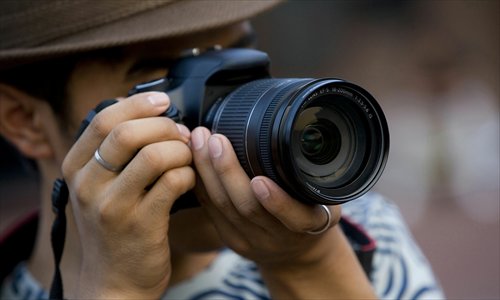HOME >> CHINA
Shutter to think
Source:Global Times Published: 2014-10-20 20:43:01

Photo: IC
The removal of a photo series displayed inside numerous Beijing subway stations, featuring landscapes of water and stones on Yuntai Mountain in Henan Province, attracted widespread public attention in late September.
The content of the bucolic image was not in question. Rather, its photographer.
Qin Yuhai, a former senior legislative official in Central China's Henan Province, was dismissed from his post for suspected "serious discipline and law violations" on September 26.
Qin, 61, was also a council member of the China Photographers Association and was awarded China's most prestigious photography prize in 2007. A number of his works have been acquired by the National Art Museum of China.
Photography can be a very expensive hobby. But for officials like Qin, equipment bought with bribe money and embezzled public funds make it a snap.
Exposed!
The Xinhua News Agency carried an article on September 23 about officials accepting bribes and using public funds to pay for their hobby.
For instance, an unidentified "senior official" used a police helicopter during a trip in Henan in order to take overhead photos of swans in the Yellow River, Xinhua reported.
His plan was fruitless, as the loud noise of helicopter scared the swans away.
Xinhua reported that Qin claimed that his all of his equipment was gifts from a local businessman. Qin allegedly got rid of his most pricey lenses and accessories before authorities launched an official probe that yielded millions of yuan in equipment.
One of Qin's prized cameras retails for some 300,000 yuan ($48,980), The Beijing News reported. In contrast, an official in Qin's salary bracket earns around 10,000 yuan a month on average.
Many of Qin's works depicting Henan's natural beauty were exhibited in subway stations in Beijing, Shanghai, Nanjing and Guangzhou.
"To be honest, his work did help to promote tourism in Jiaozuo," a tourism official in Jiaozuo, Henan Province said.
Qin previously claimed that he did not receive any fees for his works used in the Yuntai Mountain tourism campaigns.
However, The Beijing News cited an anonymous source from the Jiaozuo city government as saying that the Yuntai Mountain administrative bureau had in fact reimbursed Qin.
The source said the amount is unclear at the moment as Han Yueping, head of the Yuntai Mountain administrative bureau, has been the subject of a corruption investigation since September.
Qin was not the only official using public funds to propel his passion for photography.
Wang Huishi, former vice-mayor of Ordos, Inner Mongolia Autonomous Region, was found with more than a dozen high-end cameras in his house during a recent anti-graft investigation.
Zhang Mingji, former head of Wuhan Gas Co., a State-owned enterprise in Hubei Province, was found to have published 50 photography collections using company funds.
In June, a photo of six white SUVs carrying alleged senior officials on a photography tour in the Xilingol Grasslands of Inner Mongolia went viral online.
All those involved are currently under investigation by Inner Mongolia disciplinary authorities.
Paid to play
An anonymous news cameraman told Xinhua that many officials usually have very close links with various photography associations. He explained that photography caught on among officials not only as an artistic outlet, but also to show off the pricey equipment required among one another.
Photography associations often invite officials to join and appoint them as ranking members, another anonymous photographer told Xinhua.
"Officials can help an association launch events and obtain sponsorships for development. But most of their works are very basic," the photographer said.
Photography's popularity among officials is visible in the around 2,000 associations nationwide, according to Xinhua.
A commentary published on news portal ifeng.com concluded that at least nine corrupt officials in 2014 stepped down for accepting bribes to finance their hobbies, three of whom were amateur photographers.
For corrupt officials, photography also provides a convenient way to transmit bribes. Because art appraisal can be subjective, amateur works can be sold legitimately for astonishingly high prices.
Such channels are difficult for supervision organs to spot, the commentary said.
Corrupt officials are also known to similarly funnel funds through musical and calligraphy works.
Wang Yi, former vice-president of the China Development Bank, was touted as the composer of a popular symphony, Shenzhou Praise.
He was sentenced to death with a two-year reprieve in April 2010.
Later investigations revealed that his music was ghost written and enterprises connect with Wang were forced to sponsor and attend his concerts.
"Such hobbies give those who seek power ways to solicit bribes or apply pressure to bribe," said Wang Dongmei, a senior official from the regional procuratorate of Inner Mongolia Autonomous Region.
Not black and white
Experts argue that such hobbies provide the perfect disguise for rent-seeking.
Liu Xingxing, a public opinion analyst at people.cn, wrote that regulating official power with systems and eliminating supervision loopholes is key to solving the problem.
Zhang Ming, a professor of political science at Renmin University of China, was quoted in Liu's article on Wednesday as saying that to limit government expenses is one of the most effective ways to prevent officials from using public funds in this manner.
"When government functions are transformed and the power of officials better regulated, fewer people may offer bribes to officials. Then such hobbies will not be a problem," Zhang said.
Apart from boosting supervision, a commentary published in the Beijing Youth Daily on October 1 also noted that reducing officials' direct involvement in economic development is crucial in fighting against rent-seeking.
The commentary said that authorities that wield too much power over local economic development or monopolies of natural resources have created an inequality between enterprises and governments.
Such inequalities encourage power abuse and bribes from local businessmen, the commentary argued.
"Everyone can have hobbies, including officials … Personal interests do not affect the public unless they cross the line, violate laws and work against the public interest," read the commentary on ifeng.com.
Posted in: Society